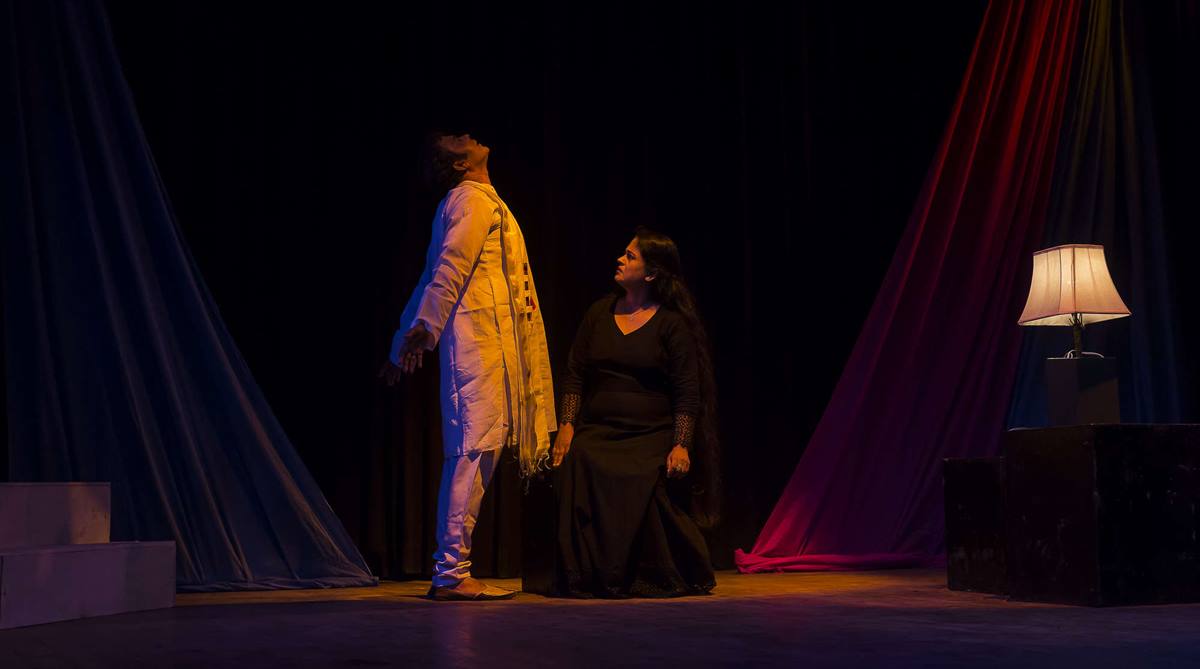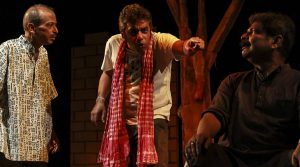Festival to promote theatre in Bengal
The Bengal Theatre Rejuvenation Festival was inaugurated on 4 November with the intention of promoting Bengali theatre.
Two plays staged by theatre group Aakriti to mark its annual night hits the right chords with audience

Akriti artistes stage Arundhati at Muktadhara auditorium in New Delhi. (Photo: SNS)
Drama society Aakriti, an amateur theatre group based in Delhi, has been performing for the past 16 years and has earned a formidable reputation in the Bengali theatre circuit. On the occasion of “Aakriti Annual Night”, the group staged two Bengali plays — Arundhati and Ô-Bhoot — at Muktadhara Auditorium in New Delhi earlier this week.
“Arundhati”, written by Shankar Basu Thakur, followed the protagonists’ journey from revenge to forgiveness, capturing the two intense human emotions of revenge and compassion.
Advertisement
“Ô-Bhoot”, written by Souvik Sengupta, on the other hand was a comedy highlighting the hypocrisy of people.
Advertisement
‘Arundhati’ starts off with a conversation between the manager of an estate and the owner’s domestic help. They were discussing the slow degeneration of the grand haveli owned by the family and their business. The haveli has been used as a metaphor for the old age zamindari finally collapsing under the hatred of Arundhati, who seeks revenge from her husband who is the owner of Chaudhary Enterprises. As her husband steps forward towards death, her revenge intensifies. He had sabotaged 26 years of her life out of lust and ego. The story has a slow start but picks up its pace as mysteries are revealed, and truth are spoken. Arundhati’s hatred and anger towards her husband and the society makes her choose the wrong path. But she is so consumed by the feeling of hatred that she gets confused, and becomes directionless. Enters Aniket, the Bohemian. He gives Arundhati numerous reasons to live again, think above the past and convinces her that love exists way beyond lust.
He succeeds to move Arundhati, who finally realises she can forgive and can live peacefully again.
Aparna Banerjee, who played Arundhati, justified her character as she could beautifully bring out the change her character undergoes. Her portrayal of Arundhati was quite strong and she was able to leave a strong impression on the mind of the audience. Aniket, played by eminent actor Palash Das, was completely convincing. The execution was beautiful and believable. The other two characters — estate manager Abhinash played by Sujit Saha and Muhim played by Ashis Some — supported the act well.

The second play of the evening, “Ô-Bhoot”, brought comic relief after a heavy Arundhati. In a lighter vein, the play showed the double faced nature of people and how much they can steep low to maintain their fake image in the society.
The character of Panchu, played by Arunava Sengupta, was very well portrayed and his comic timing was brilliant. The role of Madhab was also played very well by Souvik Sengupta with a firm hold on the character. Dakshina Ranjan Chattopadhyay, who played the bhoot (ghost), justified the character. The play was well structured and was able to generate ample amount of laughter.
The background music at both the plays was loud at times. Lighting was done by Akaash Mahamana and it was in harmony with the storylines. While the sets were created by Sudip and Supratik Biswas, makeup and costumes were by Dilip Chakrabarty.
Both the plays were directed by Souvik Sengupta, whose vision was well communicated through the acts.
Speaking to The Statesman, he said elevating the level of a play from mere performance to that of art required “resolute commitment, hard work, perseverance, skill, creativity and innovation”. “It provides amusement to audience meeting the primary objective of Aakriti despite resource crunch,” said Sengupta.
Aakriti has become one of the leading Bengali theatre groups in Delhi, with some 25 memorable productions in the past.
Advertisement